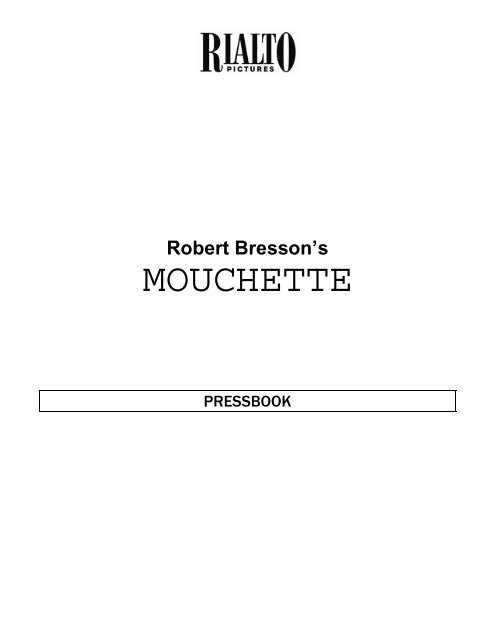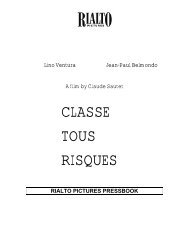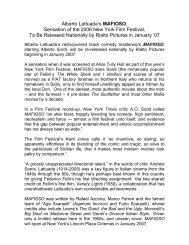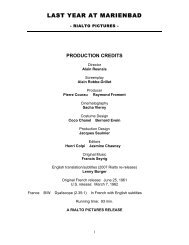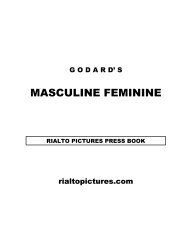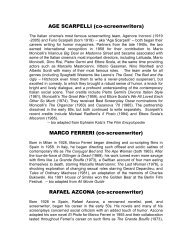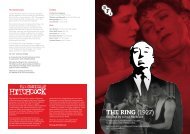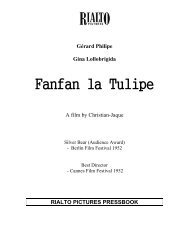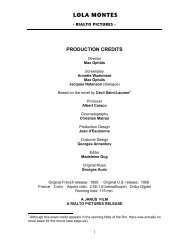download the Mouchette Pressbook - Rialto Pictures
download the Mouchette Pressbook - Rialto Pictures
download the Mouchette Pressbook - Rialto Pictures
Create successful ePaper yourself
Turn your PDF publications into a flip-book with our unique Google optimized e-Paper software.
Robert Bresson’s<br />
MOUCHETTE<br />
PRESSBOOK
Robert Bresson’s<br />
MOUCHETTE<br />
New 35mm Print at Film Forum October 14 - 20<br />
MOUCHETTE, Robert Bresson’s portrait of a young girl trying to free herself from <strong>the</strong> misery of her<br />
surroundings, will have a one-week run in a new 35mm print at Film Forum from Friday, October 14<br />
through Thursday, October 20. Tied with Buñuel’s Belle de Jour in a critics’ poll as <strong>the</strong> best French<br />
film of its year, <strong>Mouchette</strong> was this year named one of <strong>the</strong> 100 best films of all time by Time magazine.<br />
As eyes watch from <strong>the</strong> bushes, a hand sets up a simple trap that will strangle a bird. But as ano<strong>the</strong>r<br />
bird is ensnared, ano<strong>the</strong>r set of hands comes and frees <strong>the</strong>m. Fourteen-year-old <strong>Mouchette</strong> (Nadine<br />
Nortier) doesn’t say much — she won’t even sing in school, though she does throw clods of dirt at<br />
classmates — as she cares for her ailing mo<strong>the</strong>r and baby bro<strong>the</strong>r, and as her fa<strong>the</strong>r nightly trucks in<br />
smuggled booze to <strong>the</strong> local bar. But she watches as <strong>the</strong> gamekeeper and <strong>the</strong> poacher battle both<br />
professionally and personally — <strong>the</strong>y’re both sweet on <strong>the</strong> local barmaid — even as <strong>the</strong> gamekeeper’s<br />
wife can’t be bo<strong>the</strong>red with a reaction, a reaction that doesn’t even seem expected. Not an idyllic<br />
existence, but <strong>the</strong>n things can get worse.<br />
Adapted from a novel by Georges Bernanos, author of Bresson’s signature work Diary of a Country<br />
Priest, this is both a sympa<strong>the</strong>tic and a brutally unsentimental portrait, with, in <strong>the</strong> bumper cars<br />
sequence at <strong>the</strong> fair, <strong>the</strong> one moment of pure exuberance and delight in all of Bresson’s work<br />
(curiously, it’s his one addition to <strong>the</strong> novel).<br />
“An extraordinary spiritual meditation.” – Tony Rayns, Time Out (London)<br />
“One of <strong>the</strong> purest Bressons. Its effect as you watch it is beautifully unforgiving;<br />
as you recall it, brutally radiant.” – Richard Corliss, Time (2005)<br />
1967 78 minutes In French with English subtitles A <strong>Rialto</strong> <strong>Pictures</strong> release
MOUCHETTE<br />
Production Credits<br />
Written and directed by Robert Bresson<br />
Adapted from Nouvelle histoire de <strong>Mouchette</strong> by George Bernanos<br />
Producer Anatole Dauman<br />
Music by Jean Wiener & Claudio Monteverdi (Magnificat)<br />
Director of Photography Ghislain Cloquet<br />
Editor Raymond Lamy<br />
Production Design Pierre Guffroy<br />
Costume Design Odette Le Barbenchon<br />
Production Managers Michel Choquet & Philippe Dussart<br />
Assistant Camera Paul Bonis<br />
Sound by Jacques Carrère<br />
English translation/subtitles (2005) Lenny Borger<br />
Produced by Compagnie Cinematographique de France<br />
France • 1967 • Black and White • Aspect ratio 1:66:1 • In French with English Subtitles<br />
Running time: 78 minutes<br />
A RIALTO PICTURES RELEASE
CAST<br />
<strong>Mouchette</strong><br />
Nadine Nortier<br />
Arsène<br />
Jean-Claude Guilbert<br />
The Mo<strong>the</strong>r<br />
Maria Cardinal<br />
The Fa<strong>the</strong>r<br />
Paul Hebert<br />
Mathieu<br />
Jean Vimenet<br />
Mathieu's wife<br />
Marie Susini<br />
Layer Out of <strong>the</strong> Dead<br />
Suzanne Huguenin<br />
Luisa<br />
Marine Trichet<br />
Grocer<br />
Raymonde Chabrun
<strong>Mouchette</strong> by Richard Corliss, Time<br />
(“The 100 All-Time Best Movies,” 2005)<br />
Robert Bresson, his detractors would say, has a lot to answer for. In 13 films over 40 years, he<br />
developed <strong>the</strong> whole slim repertoire of exalted minimalism. Blank glances that suggest both<br />
sanctity and reproach; pregnant silences that speak libraries of meaning; an hour of mundane<br />
injustices that often explode into beatings, murders, suicides galore—<strong>the</strong>se have become <strong>the</strong><br />
vocabulary, <strong>the</strong> very clichés, of European and Asian art-house cinema. But just as we needn’t<br />
hold Steven Spielberg accountable for every crappy-sappy kids' adventure, we shouldn’t blame<br />
Bresson for creating an art form that literally hundreds of imitators reduced to non-movie<br />
sterility.<br />
Bresson’s films, however austere and obsessed with each man’s own private Calvary, have a<br />
precision of imagery, an understanding of character, that gives <strong>the</strong>m life, makes <strong>the</strong>m a joy to<br />
watch. <strong>Mouchette</strong>, one of <strong>the</strong> purest Bressons, is <strong>the</strong> story of a teenage outcast (Nadine<br />
Nortier) so abused by everyone in her village that death seems like God's caress, and so<br />
maladroit that she must try three times before she succeeds in drowning herself. Its effect as<br />
you watch it is beautifully unforgiving; as you recall it, brutally radiant.<br />
Joseph Cunneen on <strong>Mouchette</strong><br />
(from Robert Bresson: A Spiritual Style in Film Continuum, 2003)<br />
Shooting on Bresson’s next film, <strong>Mouchette</strong>, based on Georges Bernanos's novella, began<br />
only a few months after Balthasar; it was released in 1967. Though less ambitious than Diary<br />
of a Country Priest, Nouvelle Histoire de <strong>Mouchette</strong> is a work of great purity and depth – which<br />
closed <strong>the</strong> writer's novelistic career. Composed in 1936 while he was living in Majorca, its<br />
essential source of inspiration was <strong>the</strong> terror he observed during <strong>the</strong> Spanish Civil War, which<br />
broke out in July. As Bernanos affirmed,<br />
I began writing La nouvelle histoire de <strong>Mouchette</strong> after watching trucks go by<br />
commanded by armed men, holding wretched prisoners with <strong>the</strong>ir hands on <strong>the</strong>ir<br />
knees, <strong>the</strong>ir faces covered with dust. They sat up quite straight, <strong>the</strong>ir heads<br />
raised, with that dignity that <strong>the</strong> Spanish have even during <strong>the</strong> most atrocious<br />
misery. They were going to be shot <strong>the</strong> following morning. It was <strong>the</strong> one thing<br />
<strong>the</strong>y were sure of. As regards anything else, <strong>the</strong>y did not understand. If we could<br />
imagine <strong>the</strong>ir being interrogated, <strong>the</strong>y would have been incapable of defending<br />
<strong>the</strong>mselves. Against what? That would have to be explained to <strong>the</strong>m first.<br />
Well, I was struck by how impossible it was for poor people to understand <strong>the</strong><br />
frightful game in which <strong>the</strong>ir lives were involved. I was struck by <strong>the</strong> horrible
injustice of <strong>the</strong> powerful who, in order to condemn <strong>the</strong>se unhappy men, speak to<br />
<strong>the</strong>m in a language that is foreign to <strong>the</strong>m. There is an odious deception in this.<br />
And later, I would not know how to express <strong>the</strong> admiration that <strong>the</strong> courage and<br />
dignity with which I saw <strong>the</strong>se men die inspired in me.<br />
Naturally, I did not deliberately decide to make a novel out of all this. I did not say<br />
to myself, I am going to transpose what I have seen into <strong>the</strong> story of a little girl<br />
hunted down by misfortune and injustice. But what is true is, that if I had not seen<br />
<strong>the</strong>se things, I would not have written<br />
Nouvelle histoire de <strong>Mouchette</strong>.<br />
Bresson wasn't thinking of <strong>the</strong> Spanish Civil War in making <strong>Mouchette</strong>, but was undoubtedly<br />
drawn to <strong>the</strong> book's fourteen-year-old heroine and challenged by <strong>the</strong> problem of making <strong>the</strong><br />
story credible without reducing her to just ano<strong>the</strong>r example of victimhood. Since <strong>Mouchette</strong><br />
was a far less celebrated text than Diary of a Country Priest, Bresson did not have to worry so<br />
much about "fidelity" to <strong>the</strong> original. He could dispense with a narrator, <strong>the</strong>re was no need of<br />
voice-offs, and <strong>the</strong>re was no problem about changing <strong>the</strong> locale from <strong>the</strong> Artois to a small<br />
village in <strong>the</strong> Vaucluse.<br />
<strong>Mouchette</strong> was a child of poverty, with an alcoholic fa<strong>the</strong>r and older bro<strong>the</strong>r, and a desperately<br />
ill mo<strong>the</strong>r who has to call on her daughter's help to take care of a baby boy. The girl is passing<br />
through adolescence with few resources beyond her stubbornness and a healthy streak of<br />
independence. When she gets lost in <strong>the</strong> woods one evening, she meets Arsène, <strong>the</strong> village<br />
poacher; he confides that he has killed Mathieu <strong>the</strong> gamekeeper and she proudly promises to<br />
keep his secret. They take shelter in his hut, where he has an epileptic fit. After he recovers,<br />
he takes advantage of her sympathy and rapes her. She returns home in <strong>the</strong> morning, but is<br />
unable to seek comfort or guidance from her mo<strong>the</strong>r, who is dying. Later, she has a disturbing<br />
encounter with an old woman who makes it a practice to visit <strong>the</strong> homes of <strong>the</strong> bereaved and<br />
watch over <strong>the</strong> dead.<br />
Bresson's changes from <strong>the</strong> novel highlight images of <strong>the</strong> village and <strong>the</strong> surrounding<br />
landscape, which substitute for <strong>the</strong> novelist's long passages of interior meditation and Iyrical<br />
commentary. In contrast to his source, Bresson spreads <strong>the</strong> action over several days, filling in<br />
a more detailed picture of village life. He also adds an important scene at <strong>the</strong> village carnival,<br />
which becomes <strong>the</strong> occasion of <strong>Mouchette</strong>'s childlike joy while riding a bumper-car. Her<br />
moment of "escape" is all <strong>the</strong> more touching because it is quickly punctured by her fa<strong>the</strong>r's<br />
anger when she becomes friendly with a boy who was riding ano<strong>the</strong>r car. A fur<strong>the</strong>r important<br />
addition that Bresson makes is to complicate his heroine's final action, making it partly a game,<br />
in which she rolls three times down an incline to <strong>the</strong> pond. Bernanos, on <strong>the</strong> o<strong>the</strong>r hand, is<br />
more successful in communicating <strong>the</strong> supernatural element in <strong>Mouchette</strong>'s death. After a<br />
dreamlike atmosphere has been established by <strong>the</strong> girl's encounter with <strong>the</strong> old woman, <strong>the</strong><br />
novelist shares her inmost reflections:<br />
And now she was thinking of her own death, with her heart gripped not by fear
ut by <strong>the</strong> excitement of a great discovery, <strong>the</strong> feeling that she was about to learn<br />
what she had been unable to learn from her brief experience of love. What she<br />
thought about death was childish, but what could never have touched her in <strong>the</strong><br />
past now filled her with poignant tenderness, as sometimes a familiar face we<br />
see suddenly with <strong>the</strong> eyes of love makes us aware that it has been dearer to us<br />
than life itself for longer than we have ever realized.<br />
The tragic tone and opaqueness of reality already present in Au hasard Balthasar are again<br />
evident, though in simpler, more direct form. <strong>Mouchette</strong> is perhaps <strong>the</strong> most touching of<br />
Bresson's films, and its poetic realism succeeds in giving <strong>the</strong> girl's "suicide" <strong>the</strong> overtones of<br />
liberation. The film is emotionally accessible to a broad public, except for those who are unable<br />
to see anything but bleakness in its ending.<br />
Interviewed at <strong>the</strong> time of its opening, Bresson said that "<strong>the</strong> domain of cinematography is <strong>the</strong><br />
domain of <strong>the</strong> unsayable." In <strong>Mouchette</strong> this is achieved largely "by <strong>the</strong> strangeness of <strong>the</strong><br />
psychology, especially discernible during <strong>the</strong> epileptic sequence, at <strong>the</strong> instant when <strong>the</strong> girl is<br />
finally able to sing, <strong>the</strong> birth of love having, for a short time, finally reconciled her with herself."4<br />
Bresson told Jean-Luc Godard that he wanted to do <strong>Mouchette</strong> as an "essai," an exercise.<br />
"Instead of a whole group of lives and different characters . . . I want to concentrate,<br />
constantly, absolutely, on one face, <strong>the</strong> face of this little girl, to see her reactions.... And I will<br />
choose, yes, <strong>the</strong> most awkward little girl <strong>the</strong>re is, and try to draw from her everything that she<br />
will not suspect I am drawing from her. That is what interests me, and <strong>the</strong> camera will not leave<br />
her.''5 Bresson won his wager: Nadine Nortier was especially affecting as <strong>Mouchette</strong> and<br />
received <strong>the</strong> prize for best actress at <strong>the</strong> Festival of Panama.<br />
Before <strong>the</strong> Credits, <strong>the</strong>re is an image of a woman in a church—it is <strong>Mouchette</strong>'s mo<strong>the</strong>r.<br />
"Without me, what will become of <strong>the</strong>m?" she moans, and leaves <strong>the</strong> church. The credits are<br />
accompanied by Monteverdi's "Magnificat," from his Vespers for <strong>the</strong> Blessed Virgin.<br />
The opening sequence, which takes place in <strong>the</strong> woods just outside <strong>the</strong> village, summarizes<br />
<strong>the</strong> action of <strong>the</strong> movie and suggests <strong>Mouchette</strong>'s role. Hands are seen placing traps.<br />
Observant eyes detect <strong>the</strong> captured partridges. At <strong>the</strong> same time, o<strong>the</strong>r eyes are watching <strong>the</strong><br />
poacher, Arsène. There is a close-up of his eyes; <strong>the</strong>n ano<strong>the</strong>r of Mathieu, <strong>the</strong> guard, watching<br />
<strong>the</strong> poacher's every gesture. Dogs howl in <strong>the</strong> distance, <strong>the</strong> camera returns to Arsène's hands<br />
as <strong>the</strong>y move from one snare to <strong>the</strong> next. Closeups follow of a partridge approaching a snare;<br />
suddenly its head is caught. Arsène, aware that he is being watched, gradually withdraws.<br />
Ano<strong>the</strong>r closeup: Mathieu removes <strong>the</strong> snare from an injured partridge. For a moment his two<br />
hands hold <strong>the</strong> game bird, which <strong>the</strong>n flies away. A rustling of wings leads to a panoramic shot<br />
of <strong>the</strong> partridge flying to <strong>the</strong> top of <strong>the</strong> trees.<br />
The camera <strong>the</strong>n follows Mathieu, his gun on his shoulder, walking on <strong>the</strong> road to <strong>the</strong> hamlet,<br />
passing by <strong>the</strong> school just as some school girls (from nine to fifteen years old) enter. One of<br />
<strong>the</strong>m stops in front of <strong>the</strong> door and looks across <strong>the</strong> road. "<strong>Mouchette</strong>," one of her schoolmates
cries.<br />
That night, at <strong>the</strong> cafe, Arsène brings two partridges to Louisa, <strong>the</strong> waitress. She tells him to go<br />
away—but also to come back. Mathieu arrives and tries to grab Louisa's hand; although she<br />
seems disapproving, she serves him a drink. Outside <strong>the</strong> cafe, a man and his son (<strong>Mouchette</strong>'s<br />
fa<strong>the</strong>r and older bro<strong>the</strong>r) wait until a police car moves away before unloading boxes from a<br />
small truck. The owner pays <strong>the</strong>m, and <strong>the</strong>y have a drink. By <strong>the</strong> time fa<strong>the</strong>r and son drive to<br />
<strong>the</strong>ir ramshackle home <strong>the</strong>y are already drunk. <strong>Mouchette</strong> applies a poultice to her mo<strong>the</strong>r (<strong>the</strong><br />
woman seen before <strong>the</strong> credits) and calms her baby bro<strong>the</strong>r before sitting down on a straw<br />
mattress and closing her eyes.<br />
The next morning <strong>the</strong> schoolgirls hurry to class while <strong>Mouchette</strong>, wearing galoshes that are too<br />
big for her, sludges along at her own pace. Her face seems hard and closed as she reaches<br />
her place in class. The exasperated teacher lines <strong>the</strong> girls up in two rows to sing a song about<br />
Columbus pleading with his sailors to keep up <strong>the</strong>ir hopes for three more days. At first<br />
<strong>Mouchette</strong> only pretends to sing, but <strong>the</strong> teacher grabs her by <strong>the</strong> neck, brings her up next to<br />
<strong>the</strong> harmonium and forces her to try. The girl's voice is husky and false; she seems close to<br />
tears.<br />
When school is over, <strong>Mouchette</strong> rests her satchel on <strong>the</strong> grass and begins to throw balls of<br />
mud at her classmates. Most of <strong>the</strong> girls go off in groups toward <strong>the</strong> village. Two boys call from<br />
a shed to get <strong>Mouchette</strong>'s attention: one of <strong>the</strong>m unbuttons his trousers.<br />
At home <strong>the</strong> next day, <strong>Mouchette</strong> takes off her galoshes, kisses her mo<strong>the</strong>r's hand, and<br />
prepares <strong>the</strong> coffee. It is Sunday, and she helps out at <strong>the</strong> cafe. Mathieu arrives in pursuit of<br />
Louisa, following her even when she goes down to <strong>the</strong> cellar to get more wine. He is jealous<br />
but she remains evasive; when she becomes too busy with customers, he leaves for church.<br />
<strong>Mouchette</strong> dawdles outside church, getting her shoes and socks wet by stepping in a puddle.<br />
Aware of her fa<strong>the</strong>r's approach, she goes up <strong>the</strong> steps. He shoves her against <strong>the</strong> holy water<br />
font, where she makes a sign of <strong>the</strong> cross and moves away.<br />
After church, <strong>Mouchette</strong> works at <strong>the</strong> cafe, washing and drying glasses. When <strong>the</strong> manager<br />
pays her, she gives <strong>the</strong> money to her fa<strong>the</strong>r who, already tipsy, is sitting at a table outside with<br />
his son. To thank her, he hands <strong>Mouchette</strong> his half-full glass to drink. Hearing <strong>the</strong> music of an<br />
outdoor fair, <strong>the</strong> girl gets up, passes by <strong>the</strong> merry-go-round, and leans against <strong>the</strong> railing of a<br />
bumper-car rink as <strong>the</strong> attendant alerts customers to get into <strong>the</strong>ir cars. A young mo<strong>the</strong>r with a<br />
baby gives <strong>Mouchette</strong> a ticket for a ride; <strong>the</strong> girl looks up with surprise, but <strong>the</strong> woman has<br />
disappeared. <strong>Mouchette</strong> looks delighted as she gets in, spins her vehicle around, shifts into<br />
reverse, and avoids a few cars that are trying to hit hers. Jazz fills <strong>the</strong> air as a young male<br />
driver bumps her, and she smiles as she gets into <strong>the</strong> spirit of <strong>the</strong> game. At <strong>the</strong> end of <strong>the</strong> ride<br />
<strong>the</strong> young man, after looking back at <strong>Mouchette</strong>, proceeds to a shooting gallery. She follows,<br />
eyes lowered, only to have her fa<strong>the</strong>r grab her by <strong>the</strong> shoulder, spin her around, and slap her.<br />
She does not flinch, but sitting again at her fa<strong>the</strong>r's table, puts her hand on her cheek.
Arsène and Louisa hurry over to <strong>the</strong> fair and take <strong>the</strong>ir seats side by side in a miniature plane.<br />
When Mathieu returns to a table outside <strong>the</strong> cafe and sits with his wife, a customer suggests<br />
that Arsène is making a fool of him. The game warden puts his glass down and goes inside to<br />
confront Louisa, but she ignores his threats, insisting that <strong>the</strong> poacher isn't afraid of him.<br />
The next morning <strong>Mouchette</strong> kisses her mo<strong>the</strong>r, takes her satchel, and goes to class. After<br />
school, when it is almost twilight, she hides in a ditch next to a meadow to spy on her<br />
classmates. After watching one girl put perfume on two of her companions, <strong>Mouchette</strong> throws<br />
a ball of mud at <strong>the</strong>m, but <strong>the</strong> girls ride off with boys on motorized bikes. <strong>Mouchette</strong> runs to <strong>the</strong><br />
edge of <strong>the</strong> meadow and into a small woods where she suddenly stops. A fluttering of wings<br />
makes her lift up her eyes: a panoramic shot shows a partridge flying to <strong>the</strong> top of a tree.<br />
Black clouds appear and <strong>the</strong> wind rises as <strong>Mouchette</strong> proceeds deeper into <strong>the</strong> woods. The<br />
rain has become heavy and <strong>the</strong> sky is dark; her skirt is wet and her galoshes become buried in<br />
mud. She rushes to <strong>the</strong> foot of an old oak tree and sits down. Night has fallen; a pale moon is<br />
visible. Through <strong>the</strong> branches of <strong>the</strong> tree <strong>Mouchette</strong> sees Mathieu, who has stopped at a<br />
stream, and <strong>the</strong>n Arsène, who is laying a trap. The guard tells <strong>the</strong> poacher to leave Louisa<br />
alone and <strong>the</strong> enmity between <strong>the</strong> two men turns to blows Arsène knocks Mathieu down, and<br />
<strong>the</strong>y roll over on each o<strong>the</strong>r. When <strong>the</strong> top of Arsène's canteen falls out, he rushes to take<br />
several gulps of whiskey before passing it on to Mathieu.<br />
After a general shot of a dark sky, <strong>the</strong> camera closes in on <strong>Mouchette</strong>, squeezing out her wet<br />
skirt. Petrified when Arsène turns his flashlight on her, she explains that she got lost. He tells<br />
her she can't go home with only one of her galoshes, and directs her to a little cabin, where he<br />
throws a log on <strong>the</strong> fire, fishes out a bottle of alcohol, and tells her to take a gulp to warm up.<br />
After questioning <strong>Mouchette</strong> closely about her movements since school, Arsène instructs her<br />
to say that she saw him leave <strong>the</strong> bar on <strong>the</strong> route de Linières. He finds her o<strong>the</strong>r galosh, <strong>the</strong>n<br />
astonishes her by saying that a cyclone has passed through <strong>the</strong> area, and finally takes her to a<br />
barn where he lights ano<strong>the</strong>r fire.<br />
Asking her to look him in <strong>the</strong> face, Arsène tells <strong>Mouchette</strong> that he thinks he has killed<br />
someone. He remembers that he and Mathieu had been drinking, but is unclear how things<br />
turned out. Mathieu's nose was in <strong>the</strong> water, which turned red, he recalls; more recently,<br />
however, <strong>the</strong>re were rifle shots which sounded as if <strong>the</strong>y came from <strong>the</strong> guard's gun.<br />
<strong>Mouchette</strong> isn't clear what Arsène wants her to say as an alibi, but assures him of her<br />
willingness: "You can cour.t on me. I hate <strong>the</strong>m. I will stand up to all of <strong>the</strong>m."<br />
Suddenly Arsène has an epileptic attack, and <strong>Mouchette</strong> cradles his head in her hands. He<br />
has difficulty breathing and even slobbers on her; she takes out a handkerchief and wipes his<br />
face. As Arsène grows calmer he gradually loses consciousness. <strong>Mouchette</strong> begins to sing,<br />
first hoarsely, <strong>the</strong>n her voice clears and becomes pure. "Keep on hoping for three more<br />
days"—it is Columbus's song, <strong>the</strong> one <strong>the</strong>y tried to teach her in school. When Arsène recovers,<br />
he first talks of taking her home to get a drink from her fa<strong>the</strong>r, but when she tries to leave, he<br />
threatens her if she tells a word of what he has told her. "Monsieur Arsène," she pleads, "I'd
a<strong>the</strong>r kill myself than injure you." He puts his arms around her and she doesn't move, but<br />
when he tightens his grip, she pushes him and hides under a table. Finally, he kicks over <strong>the</strong><br />
table; in trying to get away, she falls in front of <strong>the</strong> fireplace, and he gets on top of her.<br />
<strong>Mouchette</strong> groans and raises her arms; <strong>the</strong>n, little by little, her arms encircle his back.... Later,<br />
she is seen with her satchel, after running away from Arsène.<br />
As soon as <strong>Mouchette</strong> opens <strong>the</strong> door of her home, her mo<strong>the</strong>r asks her to warm <strong>the</strong> baby's<br />
bottle. Since <strong>the</strong> boxes of matches are empty, she holds <strong>the</strong> bottle against her breast. Held<br />
tenderly by his big sister, <strong>the</strong> baby stops crying and drinks from <strong>the</strong> bottle, and <strong>the</strong> mo<strong>the</strong>r<br />
reminds her daughter that she should put away <strong>the</strong> washing and not leave it damp. The girl<br />
struggles with her tears; she is anxious to talk to her mo<strong>the</strong>r, but <strong>the</strong> baby begins to cry again.<br />
The mo<strong>the</strong>r is in such pain that she asks <strong>Mouchette</strong> to bring some gin. After wiping her<br />
mo<strong>the</strong>r's mouth and chin, <strong>the</strong> girl makes a last appeal—"I have to tell you something"—but it is<br />
too late: <strong>the</strong> mo<strong>the</strong>r is dead. The fa<strong>the</strong>r and older bro<strong>the</strong>r come in; <strong>the</strong>re is a panoramic shot of<br />
<strong>the</strong> two of <strong>the</strong>m kneeling at <strong>the</strong> mo<strong>the</strong>r's bed, <strong>the</strong>n we see <strong>Mouchette</strong> asleep on a straw<br />
mattress next to her baby bro<strong>the</strong>r who has become quiet.<br />
In <strong>the</strong> morning a woman neighbor brings a pot of coffee. <strong>Mouchette</strong>, ready to go out to get milk<br />
for <strong>the</strong> baby, stares at her fa<strong>the</strong>r. When he insults her, calling her a boor, she simply answers<br />
"Merde" and leaves quickly.<br />
<strong>Mouchette</strong>, carrying her milk can, passes <strong>the</strong> grocer's and is called in to have a cup of coffee.<br />
The woman gives her a croissant, but when <strong>the</strong> girl accidentally breaks <strong>the</strong> bowl of coffee, she<br />
calls her a slut. <strong>Mouchette</strong> continues walking through <strong>the</strong> village as peasant women enter <strong>the</strong><br />
church. At Mathieu's house she is asked to come in, and <strong>the</strong> game warden informs her that<br />
Arsène has been arrested for dynamiting <strong>the</strong> river, but claims that he met <strong>Mouchette</strong> at a<br />
different spot. Hoping to help <strong>the</strong> poacher, <strong>Mouchette</strong> says that she spent <strong>the</strong> whole night with<br />
Arsène in <strong>the</strong> cabin. When Mme. Mathieu, realizing that <strong>the</strong> girl is still reeking of gin, asks her<br />
to come back and talk to her, <strong>Mouchette</strong> bursts out, "Monsieur Arsène is my lover," and<br />
leaves.<br />
As she returns through <strong>the</strong> village, <strong>the</strong> old woman whose practice is to watch over dead people<br />
calls her into her house. She tells <strong>Mouchette</strong> that <strong>the</strong> dead are no longer being properly cared<br />
for and that she has some clo<strong>the</strong>s for her. "I love <strong>the</strong> dead," she says, "I understand <strong>the</strong>m very<br />
well." When <strong>Mouchette</strong> tells <strong>the</strong> woman she is disgusting, <strong>the</strong> latter replies that <strong>the</strong> girl is evil<br />
but never<strong>the</strong>less hands her a package of clo<strong>the</strong>s.<br />
<strong>Mouchette</strong> jumps a ditch and starts out across <strong>the</strong> fields, observing hares that are being killed<br />
by hunters. She reaches <strong>the</strong> edge of a pond, pulls a white muslin dress out of <strong>the</strong> package,<br />
and places it against her body. With <strong>the</strong> robe held around her, she rolls down <strong>the</strong> slope to <strong>the</strong><br />
edge of <strong>the</strong> water. She gets up and makes a sign to someone driving a tractor, who continues<br />
on his way. She rolls down a second time. The third time, we hear <strong>the</strong> sound of <strong>Mouchette</strong><br />
falling into <strong>the</strong> water. After a moment <strong>the</strong> stream seems smooth again. The film ends with a<br />
return to <strong>the</strong> healing music of Monteverdi's "Magnificat."
If <strong>Mouchette</strong> has a less complex plot structure and fewer missing pieces to puzzle out than <strong>the</strong><br />
majority of his films, it remains a work of Bresson's maturity, most noticeably in its suggestive<br />
use of sound. The extreme sparseness of language leaves <strong>the</strong> audience free to give full<br />
attention to every oral cue. As in his earlier movies, sometimes <strong>the</strong> sounds announce a scene<br />
that is about to begin; at o<strong>the</strong>rs, one noise blends into ano<strong>the</strong>r. The locale, an out-of-<strong>the</strong>-way<br />
country area in nor<strong>the</strong>rn Vaucluse, is constantly filled with <strong>the</strong> din of trucks passing close to <strong>the</strong><br />
village; appropriately enough, this sound is far more insistent than that of church bells. The<br />
pelting rain <strong>the</strong> night <strong>Mouchette</strong> gets lost in <strong>the</strong> woods, <strong>the</strong> constant slapping of her galoshes<br />
as she walks, <strong>the</strong> pom-pom of <strong>the</strong> fairground music, <strong>the</strong> clinking of <strong>the</strong> glasses on <strong>the</strong> counter<br />
of <strong>the</strong> bar, <strong>the</strong> cries of <strong>the</strong> baby, <strong>the</strong> movement of <strong>the</strong> straw as <strong>Mouchette</strong> struggles with<br />
Arsène—all contribute to <strong>the</strong> film's overall impact. At <strong>the</strong> end it is likely that <strong>the</strong> passing trucks<br />
make it impossible for <strong>the</strong> man driving <strong>the</strong> tractor to hear <strong>Mouchette</strong> when she makes what<br />
may have been a last appeal for help.<br />
Bresson's choice of ano<strong>the</strong>r text by Bernanos has a great deal to do with his rejection of <strong>the</strong><br />
elaborate psychologizing in <strong>the</strong> previous generation of French films. As he responded in a<br />
questionnaire in L’Avant-scène,<br />
The absence of psychology and analysis in his [Bernanos's] books coincides with<br />
<strong>the</strong> absence of psychology and analysis in my films. His perspective in regard to<br />
<strong>the</strong> supernatural is sublime. For my part, I have always considered <strong>the</strong><br />
supernatural as <strong>the</strong> natural seen up close.... Agony? I am often astonished to see<br />
how tranquil people are.... It is precisely incommunicability that makes union, and<br />
ultimately communion, possible.<br />
<strong>Mouchette</strong> is also ano<strong>the</strong>r demonstration of Bresson's preference for images over dialogue.<br />
With <strong>the</strong> exception of <strong>the</strong> conversation between Arsène and <strong>Mouchette</strong> in <strong>the</strong> cabin, <strong>the</strong><br />
reliance on language is minimal. "If <strong>the</strong>re is painting in a novel in place of analysis and<br />
psychology, it is still with words," Bresson insisted. "If <strong>the</strong>re is analysis and psychology in my<br />
films, it is with images and ra<strong>the</strong>r in <strong>the</strong> manner of portrait-painters."7 In his novella, of course,<br />
Bernanos could use authorial reflection to indicate interior changes of feeling; in <strong>the</strong> film, since<br />
<strong>the</strong>re is no narrator, and <strong>Mouchette</strong> is only partly conscious of what she is going through,<br />
Bresson has to find o<strong>the</strong>r ways to express her loneliness, stubbornness, independence, and<br />
deep need of affection.<br />
<strong>Mouchette</strong>'s lack of parental guidance is obvious her fa<strong>the</strong>r is an alcoholic who shows no<br />
tenderness for her; her mo<strong>the</strong>r is ill throughout, and has to pass on a good deal of <strong>the</strong><br />
responsibility of caring for a baby bro<strong>the</strong>r. Just as <strong>Mouchette</strong> comes back in <strong>the</strong> morning<br />
hoping to be able to tell her mo<strong>the</strong>r what had happened during <strong>the</strong> night, <strong>the</strong> poor woman<br />
expires. The fa<strong>the</strong>r slaps his daughter just as she is enjoying a moment of escape at <strong>the</strong> fair;<br />
when she hands over <strong>the</strong> coins she has earned by helping out in <strong>the</strong> cafe, he simply hands her<br />
what is left of his gin. Her isolation from <strong>the</strong> o<strong>the</strong>r girls at school is extreme, and her "revenge"<br />
by throwing mud balls is pa<strong>the</strong>tic. Bresson's use of Columbus's song of hope is brilliant under
compulsion from her teacher <strong>Mouchette</strong> seems unable to sing and produces nothing but a<br />
hoarse creaking; <strong>the</strong> clear, pure sounds she utters after comforting Arsène during his epileptic<br />
attack create <strong>the</strong> most touching moment in <strong>the</strong> film.<br />
The movie's opening sequence with Arsène setting traps and Mathieu spying on him is<br />
repeated with a difference when, near <strong>the</strong> conclusion, <strong>Mouchette</strong> walks across <strong>the</strong> fields where<br />
men are hunting. The fact that at <strong>the</strong> beginning one partridge is killed while <strong>the</strong> o<strong>the</strong>r flies into<br />
<strong>the</strong> sky is open to varied interpretations; in any case, <strong>Mouchette</strong> is clearly linked with <strong>the</strong><br />
imagery of an animal being tracked down. Of course, it is no accident that <strong>Mouchette</strong> follows<br />
Au hasard Balthasar; both movies, shot in country areas, make an important use of animals.<br />
Jean-Claude Gilbert, who had been Arnold in Balthasar, is used here again as Arsène, <strong>the</strong><br />
only such "return" of a Bresson model. Obviously, <strong>the</strong>re is considerable complexity in both<br />
characters; despite his attack on <strong>Mouchette</strong> and his heavy drinking, <strong>the</strong> poacher is seen with a<br />
degree of sympathy. His poaching is looked on with indulgence, and even though he is making<br />
use of <strong>Mouchette</strong> to create an alibi, she is glad of <strong>the</strong> chance to help: it is <strong>the</strong> first time<br />
someone has treated her like an adult.<br />
Apart from Bresson's prior interest in Bernanos, <strong>the</strong> director was probably especially drawn to<br />
<strong>Mouchette</strong> as a character between childhood and adolescence, where a certain toughness is<br />
worn as a defense. On several occasions, she gives way to tears; she shows her childishness<br />
by splashing her feet in little pools of water and throwing balls of mud; and she enjoys pouring<br />
<strong>the</strong> café au lait in bowls placed alongside each o<strong>the</strong>r without raising <strong>the</strong> lid of <strong>the</strong> pot. At <strong>the</strong><br />
same time, she is dimly aware that she is growing into a new stage of existence; she accepts<br />
her responsibilities at home, is glad to be earning a few coins at <strong>the</strong> cafe, and cannot help<br />
feeling left out when some of her classmates ride off on <strong>the</strong> back of boys' motorbikes.<br />
The power of <strong>the</strong> film derives largely from Bresson's mature mastery of montage. "To edit a<br />
film," he told Georges Sadoul, "is to link people with glances." As Michel Mortier wrote,<br />
In fact, we can look at <strong>Mouchette</strong> as a film that pays attention to nothing except<br />
<strong>the</strong> exchange of glances. First, <strong>the</strong>re are those of Arsène on <strong>the</strong> lookout for<br />
game, and of Mathieu watching Arsène. There are <strong>Mouchette</strong>'s fearful glances at<br />
her teacher, her admiring look at <strong>the</strong> boy when she is riding <strong>the</strong> bumper-car, <strong>the</strong><br />
loving and protective glances at Arsène during his epileptic fit, her imploring look<br />
at her mo<strong>the</strong>r who is already dead, <strong>the</strong> scorn she directs at <strong>the</strong> grocer's wife and<br />
<strong>the</strong> old lady who watches over <strong>the</strong> dead, and <strong>the</strong> pleading with which she looks<br />
at <strong>the</strong> peasant a few minutes before she drowns herself.<br />
Monteverdi's "Magnificat" is used only at <strong>the</strong> opening and <strong>the</strong> close. Though powerful and<br />
appropriate, it marks Bresson's last use of background music. The danger is that its<br />
accompanying text, Mary's response to <strong>the</strong> greeting of her cousin Elizabeth, has become such<br />
a cliche that we no longer recognize <strong>the</strong> boldness of its assertions—taken from different books<br />
of <strong>the</strong> Hebrew Bible—or <strong>the</strong> implications of <strong>the</strong>ir association with <strong>Mouchette</strong>:
My soul proclaims <strong>the</strong> greatness of <strong>the</strong> Lord,<br />
and my spirit exults in God my savior;<br />
because he has looked upon his lowly handmaid.<br />
Yes, from this day forward all generations shall call me blessed,<br />
for <strong>the</strong> Almighty has done great things for me…<br />
He has shown <strong>the</strong> power of his arm,<br />
he has routed <strong>the</strong> proud of heart.<br />
He has pulled down princes from <strong>the</strong>ir thrones and exalted <strong>the</strong> lowly,<br />
The hungry he has filled with good things, <strong>the</strong> rich sent empty away…<br />
(Luke 1:46-52)<br />
Inevitably, commentators have given special attention to <strong>Mouchette</strong>'s "suicide," a few even<br />
speculating naively that such an ending indicates a weakening of Bresson's Catholicism. Most<br />
critics were able to recognize, however, that her act was carried out under duress, with some<br />
reluctance, and while she was still under <strong>the</strong> influence of <strong>the</strong> old woman who seemed so<br />
familiar with <strong>the</strong> dead. Michel Estève, an authority on both Bernanos and Bresson, says<br />
Bresson's poetic realism imposes on us <strong>the</strong> certitude of (<strong>Mouchette</strong>'s) liberation,<br />
but does not let us sense <strong>the</strong> deep motivation that <strong>the</strong> supernatural realism of<br />
Bernanos would suggest.... The novelist makes us feel a dreamlike and<br />
supernatural dimension of events . . . at <strong>the</strong> very heart of <strong>the</strong> suffering linked to<br />
<strong>the</strong> deepest misery.... <strong>Mouchette</strong>'s dream also transmits <strong>the</strong> appeal of eternity.<br />
The suicide of <strong>Mouchette</strong> affirms itself, beyond despair and <strong>the</strong> temptation of<br />
Satan, as a quest for super-terrestrial value that would alone be capable of<br />
making one attain ano<strong>the</strong>r life.<br />
It would be wrong, of course, to use <strong>the</strong> choice of Monteverdi to flatten out Bresson's ending<br />
into explicitly Christian terms, especially since he was increasingly inclined to leave his<br />
conclusions open-ended. The imagery is endlessly suggestive, especially <strong>the</strong> fact that <strong>the</strong> robe<br />
<strong>the</strong> old lady gives her can easily be seen as a wedding garment, and that <strong>Mouchette</strong>'s gesture<br />
to <strong>the</strong> peasant on <strong>the</strong> tractor apparently went unnoticed. In any case, it is only fair to claim that<br />
<strong>Mouchette</strong> is accessible to audiences of all backgrounds. To those who see only <strong>the</strong> film's pain<br />
and darkness, Georges Sadoul's response should prove helpful: "For me, this cry of horror,<br />
this sublime dance of death, is not a 'song of despair,' but above all a hymn of iresistance to<br />
atrocity.' Are not both those who believe in heaven and those who do not able in this case to<br />
find <strong>the</strong>mselves in unreserved agreement as bro<strong>the</strong>rs in a 'Capital of pain?''' Tilliette's insight is<br />
also worth recording: "In <strong>the</strong> universal connivance with evil and temptation, <strong>Mouchette</strong> has in<br />
some way been spared. Wild, stubborn, tormented, she is a savage who has been softened, a<br />
pale light reflected on her face.... Bresson has let himself be guided by <strong>the</strong> limpid spontaneity<br />
of his young interpreter; he who demands so much docility of his models is in turn infinitely<br />
attentive to <strong>the</strong>ir interior truth.''
Mortier is surely right in arguing against those critics who reject <strong>the</strong> film because <strong>the</strong>y see in it<br />
an unhealthy Christian praise of resignation:<br />
<strong>Mouchette</strong> is not resigned; she too is in revolt. She could very well not be<br />
Christian. Is she? How many sisters does she have in all latitudes and in all<br />
religions and "non-religions"? Her revolt is pa<strong>the</strong>tic. If all <strong>the</strong> <strong>Mouchette</strong>s of <strong>the</strong><br />
world disappeared, wouldn't society secrete new ones? But before all those who<br />
suffer take efficacious means to eliminate <strong>the</strong> causes of <strong>the</strong>ir suffering, <strong>the</strong>y must<br />
understand <strong>the</strong>ir situation. And <strong>Mouchette</strong> can help <strong>the</strong>m.<br />
BRESSON ON “MOUCHETTE”<br />
Excerpt from an interview with Charles Thomas Samuels<br />
(from Samuels’ Encountering Directors, G.P. Putnam’s and Sons, 1972)<br />
I want to move from Au Hasard Balthazar to <strong>Mouchette</strong>, which is very easy because <strong>the</strong>y<br />
resemble each o<strong>the</strong>r more than any o<strong>the</strong>r two of your films. Indeed, <strong>the</strong> latter seems a<br />
new version of <strong>the</strong> former. Do you agree?<br />
Perhaps it is because this was <strong>the</strong> first time that I shot two films in successive years.<br />
<strong>Mouchette</strong> is like <strong>the</strong> donkey: stubborn, sordid, long-suffering.<br />
Both are victims.<br />
One difference between Bernanos' novel and your film is that Bernanos explains<br />
<strong>Mouchette</strong>'s motives....<br />
All <strong>the</strong> time! But how can he know what goes on in a little girl's mind!<br />
Oddly enough, though, I understand her suicide more in <strong>the</strong> film than in <strong>the</strong> novel.<br />
Because his explanation is wrong, like his description of her suicide; you don't jump in <strong>the</strong><br />
water <strong>the</strong> way you put your head on a pillow. When I was reading <strong>the</strong> novel, I thought at once<br />
that she had to die as she does in <strong>the</strong> film.<br />
So heartbreakingly, for it is a game, <strong>the</strong> only game she ever plays in <strong>the</strong> film.<br />
You know death is like a magic trick: In a flash, <strong>the</strong> person vanishes. That is why I don't show<br />
her falling in <strong>the</strong> water. We see her rolling down <strong>the</strong> bank, <strong>the</strong>re is a cut, and she is gone; we<br />
know she is dead only from <strong>the</strong> sound and <strong>the</strong> circles growing in <strong>the</strong> water.<br />
Obviously, you must show <strong>Mouchette</strong>'s suicide because that is <strong>the</strong> conclusion of
Bernanos' novel, but as a Christian how do you feel about it? You seem to celebrate<br />
suicide—<strong>the</strong> blast of <strong>the</strong> Magnificat at her death—but isn't this heretical?<br />
Yes, but I confess that more and more suicide loses its sinfulness to me. Killing oneself can be<br />
courageous; not killing oneself, because you wish to lose nothing, even <strong>the</strong> worst that life has<br />
to offer, can also be courageous. Since I live near <strong>the</strong> Seine, I have seen many people jump<br />
into <strong>the</strong> river in front of my windows. It's remarkable that more don't do it. There are so many<br />
reasons for suicide, good and bad. I believe that <strong>the</strong> church has become less rigorous against<br />
it. Sometimes it is inevitable, and not always because of madness. To be aware of a certain<br />
emptiness can make life impossible.<br />
On <strong>the</strong> surface it seems that <strong>Mouchette</strong> kills herself because life is so terrible, but I<br />
think <strong>the</strong> real reason is that she is so ashamed of herself for what has happened to her.<br />
Do you agree?<br />
There are so many motives, which is why this film isn't too bad. I explain nothing, and you can<br />
understand it any way you like. Still, you must feel that no single explanation will suffice. One is<br />
<strong>the</strong> wall placed before her by o<strong>the</strong>r people after <strong>the</strong> rape. She can't live in <strong>the</strong> village; she can't<br />
live in <strong>the</strong> house. Then too, she has been abused by a man whom she started to love.<br />
Not only does she love him, but she forgives him his crime. She blames herself.<br />
You must have noticed that in <strong>the</strong> film <strong>the</strong>re is not one word about what her experience means.<br />
Why did you include <strong>the</strong> prologue in which <strong>the</strong> mo<strong>the</strong>r is in church lamenting her<br />
tuberculosis?<br />
To introduce this sick woman early so that I can pick her up later without having to make<br />
elaborate preparations. Later we see what her illness has done to her faith.<br />
Here and in Balthazar one senses a new fascination with pain.<br />
Yes?<br />
Why?<br />
Perhaps because I feel that pain must be acknowledged no less than happiness.<br />
The opening of <strong>Mouchette</strong> seems to me <strong>the</strong> greatest in your films....<br />
When I was young, I hunted small animals in exactly this way. It is not exactly a symbol, but it<br />
provides <strong>the</strong> right atmosphere.<br />
It introduces <strong>Mouchette</strong>.
But not like a symbol! It shows <strong>the</strong> sort of world in which she lives. If you like, she is caught,<br />
just as <strong>the</strong> partridges are caught, in a trap.<br />
I love also <strong>the</strong> amusement park sequence, which is so poignant, since it shows<br />
<strong>Mouchette</strong> having her one moment of pleasure by being hit in bump cars. Even pleasure<br />
involves being hit for her. But I was curious why you shot it as you did, with <strong>the</strong><br />
stationary camera that misses some of <strong>the</strong> action.<br />
Only a stationary camera permits you to show real movement—<strong>the</strong>re is no o<strong>the</strong>r way.<br />
The constricted framing is marvelous; it keeps us from feeling released. It prepares us<br />
for that horrible slap with which <strong>the</strong> fa<strong>the</strong>r, inevitably, concludes <strong>Mouchette</strong>'s one<br />
moment of enjoyment.<br />
Perhaps; at least at <strong>the</strong> time I had no sense that my shot was mistaken.<br />
Why does that unidentified woman give <strong>Mouchette</strong> <strong>the</strong> money to take <strong>the</strong> ride?<br />
Why not? Life is very often like that. It is <strong>the</strong> same in A Man Escaped, when <strong>the</strong> man, whom<br />
Fontaine doesn't really know, knocks at <strong>the</strong> door of his cell. Can you imagine if I had to explain:<br />
"My little girl, you are so poor, I will let you take this ride"?<br />
Robert Bresson in conversation with Ronald Hayman: The following was first published<br />
in <strong>the</strong> Transatlantic Review No. 46/7, Summer 1973 (London).<br />
At <strong>the</strong> end of <strong>Mouchette</strong> where <strong>the</strong>re are <strong>the</strong>se two playful attempts at what could be<br />
suicide before <strong>the</strong> third one, which is fatal, do you see it as being chance—or<br />
something more—that kills her?<br />
I wanted <strong>the</strong> ambiguity. What shocked me in <strong>the</strong> book is that Bernanos made her die by<br />
wanting to put her head in <strong>the</strong> water as if on her pillow in bed. I've never seen anyone<br />
committing suicide like that—waiting for death in <strong>the</strong> water. But <strong>the</strong> funny thing is that when I<br />
read <strong>the</strong> book I immediately knew how <strong>the</strong> film should end. The first thing that I knew is that<br />
she should die by rolling downhill into <strong>the</strong> water. It was an intuition, and I didn't hesitate for a<br />
second. But I wanted her to make three attempts so that we know what she wants before<br />
anything decisive happens. But it's a game. There are many ways of committing suicide and<br />
Russian roulette is one. Rolling downhill is a little girl's game which is her equivalent.<br />
It's like what happened when she had <strong>the</strong> baby in her arms. I didn't ask her to look like a<br />
mo<strong>the</strong>r or to think she was a mo<strong>the</strong>r. She just took <strong>the</strong> baby and put its hand on her breast.<br />
Then <strong>the</strong> baby takes its milk and her tears begin to fall. They were real, sincere tears. I didn't
think you arrive at <strong>the</strong> truth by means of <strong>the</strong> truth. As in painting, which is a mechanical<br />
process. Writing too—you write with words. One day <strong>the</strong> painter Degas was trying to write<br />
poetry and he meets Mallarmé and says to him, "I was trying to write a poem today, but I didn't<br />
have any ideas." Mallarmé said, "But you don't write poems with ideas. You write poems with<br />
words." It's <strong>the</strong> same with <strong>the</strong> cinema. You don't make a film with <strong>the</strong> <strong>the</strong>atre of life but with<br />
images put toge<strong>the</strong>r.<br />
Robert Bresson<br />
The known facts of Robert Bresson’s life are as elliptical and mysterious as many of his films.<br />
Though his official year of birth was 1907, he was in fact born in 1901, in Bromont-Lamo<strong>the</strong>, in<br />
<strong>the</strong> Auvergne region. His fa<strong>the</strong>r was an officer. His first vocation was painting, and occasionally<br />
photography.<br />
He entered <strong>the</strong> film industry in <strong>the</strong> early 30s, working as a screenwriter and assistant on a<br />
handful of films. In view of his later career, Bresson made one of <strong>the</strong> most surprising of<br />
writing-directing debuts in 1934. Les Affaires publiques was a medium-length screen farce<br />
which featured a famous clown named Béby (<strong>the</strong> subject of Jean-Pierre Melville’s first film<br />
short in 1946) and future Grand Illusion player Marcel Dalio. Long believed lost, it was<br />
rediscovered (in a truncated version) at <strong>the</strong> Cinémathèque Française in <strong>the</strong> mid-80s. 50 years<br />
later, Bresson remarked: “Seeing it again, I was surprised to more or less find <strong>the</strong> way I seize<br />
on things and put <strong>the</strong>m toge<strong>the</strong>r, <strong>the</strong> way in which <strong>the</strong> shots follow one ano<strong>the</strong>r.”<br />
Bresson had to wait ano<strong>the</strong>r decade before making his feature film debut. After being a POW,<br />
he returned to Occupied Paris to find backers for his film projects. His first two films had<br />
distinctive literary pedigrees: Les Anges du péché (1943), a spiritual melodrama set in a<br />
convent, was scripted by Jean Giraudoux, and Les Dames du Bois de Boulogne (1944-45),<br />
was adapted from Diderot’s Jacques le Fataliste by Jean Cocteau. Both were cast with<br />
professional actors against whom Bresson would revolt beginning with his next film, The Diary<br />
of a Country Priest (1951), an adaptation of Georges Bernanos’s novel that brought <strong>the</strong><br />
filmmaker to international attention. The film marked <strong>the</strong> birth of Bresson’s ascetically mature<br />
screen style. By <strong>the</strong> end of <strong>the</strong> decade Bresson produced two o<strong>the</strong>r masterpieces, A Man<br />
Escaped (1956), an extraordinary blend of prison escape movie suspense and spiritual quest<br />
no doubt enriched by his own experiences as a POW in 1940, and Pickpocket (1959), <strong>the</strong> first<br />
film for which Bresson wrote an original scenario not adapted from a pre-existing work.<br />
Bresson’s next film, The Trial of Joan of Arc (1962) is often considered to be Bresson’s least<br />
successful film, its austerity making Dreyer’s version seem lavish by comparison. On <strong>the</strong> o<strong>the</strong>r<br />
hand, Bresson reached his critically acclaimed apogee with Au Hasard Balthazar and
<strong>Mouchette</strong> (1967), in which he returned to Bernanos for his material. He next turned to<br />
Dostoevsky for <strong>the</strong> plots of his next two films: Une femme douce (1969) was his first in color<br />
and introduced French actress Dominique Sanda, and Four Nights of a Dreamer (1972).<br />
Lancelot of <strong>the</strong> Lake (1974) was Bresson’s second period recreation (after Joan of Arc) and<br />
also divided <strong>the</strong> critics. Nor was The Devil Probably (1977) rated among Bresson’s finest<br />
works. Bresson was 81 when he made his last film, L’Argent (1982), based on a Tolstoy<br />
novella. Shown at <strong>the</strong> 1983 Cannes Film Festival, it shared a consolation prize (<strong>the</strong> Grand Prix<br />
du cinema de création) with Andrei Tarkovsky’s Nostalghia. During <strong>the</strong> 80s, Bresson tried in<br />
vain to mount a production of Genesis, a re-telling of <strong>the</strong> Bible.<br />
Bresson published a volume of observations and aphorisms on <strong>the</strong> cinema in 1975, Notes sur<br />
le cinématographe (inaccurately translated as Notes on <strong>the</strong> Cinematographer in its English<br />
language edition).<br />
Robert Bresson died on December 18, 1999 at <strong>the</strong> age of 98.<br />
Ghislain Cloquet<br />
(Director of Photography)<br />
Born in Belgium in 1924, Cloquet trained at <strong>the</strong> famous IDHEC film school in Paris after World<br />
War II. He began his career as lighting cameraman on Alain Resnais' famous short films Les<br />
Statues meurent aussi (1953), Night and Fog (1955) and Toute la mémoire du monde (1956).<br />
In 1960, he photographed Jacques Becker’s final masterpiece, Le Trou and Claude Sautet’s<br />
debut feature, <strong>the</strong> film noir masterpiece Classe tous risques (opening for a 2-week run at Film<br />
Forum on November 18; virtually unseen in this country, it will be released nationally by <strong>Rialto</strong><br />
<strong>Pictures</strong>).<br />
Working with equal mastery in black & white and color, Cloquet photographed Jacques Demy’s<br />
The Young Girls of Rochefort (1967) and Donkey Skin (1970). He lit all <strong>the</strong> major films of his<br />
countryman, André Delvaux, shot Louis Malle’s The Fire Within (1963), and shot three Bresson<br />
masterworks: Au Hasard Balthazar (196x), <strong>Mouchette</strong> (1967) and Une femme douce (1969).<br />
Cloquet also worked with Marguerite Duras, Claude Berri and Nina Companeez.<br />
He worked with Arthur Penn on Mickey One (1965) and Four Friends (1981), shot Woody<br />
Allen’s Love and Death (1975), and shared an Academy Award with Geoffrey Unsworth for<br />
Roman Polanski’s Tess (1979). Cloquet also worked in television.
RIALTO PICTURES<br />
Described as “<strong>the</strong> gold standard of reissue distributors” by Los Angeles Times/NPR film critic<br />
Kenneth Turan, <strong>Rialto</strong> <strong>Pictures</strong> was founded in 1997 by Bruce Goldstein. A year later,<br />
Adrienne Halpern joined him as partner. In 2002, Eric Di Bernardo became <strong>the</strong> company’s<br />
National Sales Director.<br />
<strong>Rialto</strong>’s past releases have included Renoir’s Grand Illusion; Carol Reed’s The Third Man;<br />
Fellini’s Nights of Cabiria; Jules Dassin’s Rififi; De Sica’s Umberto D; Godard’s Contempt,<br />
Band of Outsiders and A Woman is a Woman; Julien Duvivier’s Pépé le Moko; Buñuel’s<br />
Discreet Charm of <strong>the</strong> Bourgeoisie, Diary of a Chambermaid, The Phantom of Liberty, The<br />
Milky Way and That Obscure Object of Desire; John Schlesinger’s Billy Liar; Clouzot’s Quai<br />
des Orfèvres; Mike Nichols’ The Graduate; The Maysles’ Grey Gardens; Mel Brooks’ The<br />
Producers; Jacques Becker’s Touchez Pas Au Grisbi; Bresson’s Au Hasard Balthazar;<br />
Franju’s Eyes Without A Face; and Jean-Pierre Melville’s Bob le Flambeur and Le Cercle<br />
Rouge, <strong>the</strong> latter released for <strong>the</strong> first time in its uncut European version.<br />
In 2002, <strong>the</strong> company released <strong>the</strong> critically-acclaimed first-run film Murderous Maids, <strong>the</strong><br />
chilling true story of two homicidal sisters, starring Sylvie Testud.<br />
<strong>Rialto</strong>’s 2004 slate included <strong>the</strong> original 1954 Japanese version of Ishiro Honda’s Godzilla,<br />
never before released in <strong>the</strong> U.S.; Peter Davis’s Oscar-winning 1974 documentary Hearts and<br />
Minds; and Gillo Pontecorvo’s groundbreaking The Battle of Algiers, which became one of last<br />
year’s top-grossing foreign films.<br />
Currently in release are Godard’s Masculine Feminine, Claude Berri’s The Two of Us, and<br />
Louis Malle’s Elevator to <strong>the</strong> Gallows. Later this year, <strong>Rialto</strong> will release Bresson’s <strong>Mouchette</strong><br />
and Claude Sautet’s rarely-seen film noir Classe Tous Risques, in its first U.S. <strong>the</strong>atrical<br />
screenings in 45 years. Classe Tous Risques, a favorite of Melville and John Woo, stars Jean-<br />
Paul Belmondo (in his first film after Breathless) and Army of Shadow’s Lino Ventura.<br />
In 1999 <strong>Rialto</strong> received a special Heritage Award from <strong>the</strong> National Society of Film Critics, and<br />
in 2000 received a special award from <strong>the</strong> New York Film Critic’s Circle, presented to<br />
Goldstein and Halpern by Jeanne Moreau. The two co-presidents have each received <strong>the</strong><br />
French Order of Chevalier of Arts and Letters.<br />
<strong>Rialto</strong> is proud to have Army of Shadows included in this year’s Telluride Film Festival. The<br />
company plans to open <strong>the</strong> film, which has never had a U.S. release, in early 2006.<br />
<strong>Pressbook</strong> edited and annotated by Bruce Goldstein<br />
Additional material: Lenny Borger<br />
New material © 2005 <strong>Rialto</strong> <strong>Pictures</strong> LLC<br />
www.rialtopictures.com


